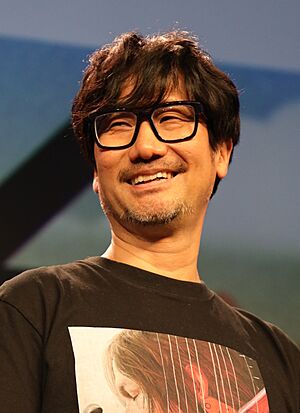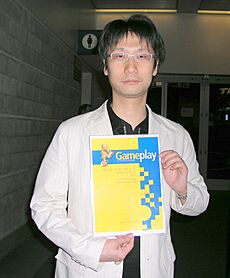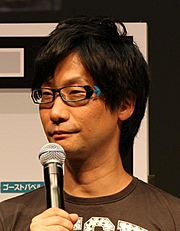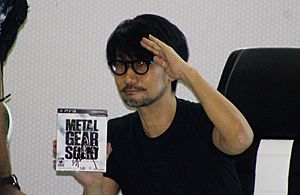Hideo Kojima facts for kids
Quick facts for kids
Hideo Kojima
|
|
|---|---|
| 小島 秀夫 | |

Kojima at SXSW 2025
|
|
| Born | August 24, 1963 Setagaya, Tokyo, Japan
|
| Occupation |
|
| Years active | 1986–present |
| Employer |
|
|
Notable work
|
Metal Gear, Snatcher, Policenauts, Zone of the Enders, Death Stranding |
| Title |
|
| Children | 2 |
| Signature | |
 |
|
Hideo Kojima (小島 秀夫, Kojima Hideo, born August 24, 1963) is a famous Japanese video game designer. Many people see him as a pioneer in making video games. He loved movies and books when he was young. This passion greatly influenced the games he created.
In 1986, Kojima joined Konami, a big game company. There, he directed and wrote Metal Gear (1987). This game helped create the stealth game style. It also started the Metal Gear series, which is his most famous work. At Konami, he also made the Zone of the Enders games. He also designed and wrote Snatcher (1988) and Policenauts (1994). These were graphic adventure games known for looking like movies.
Kojima started his own studio, Kojima Productions, within Konami in 2005. He became a vice president at Konami Digital Entertainment in 2011. He left Konami in 2015 and restarted Kojima Productions as an independent company. His first game after leaving Konami was Death Stranding, released in 2019. A sequel, Death Stranding 2: On the Beach, was released in 2025.
Early Life and Dreams
Hideo Kojima was born on August 24, 1963, in Setagaya, Tokyo. He is the youngest of three children. His family moved to Osaka when he was four. He spent a lot of time indoors, watching TV or making figurines.
His parents loved watching movies together every night. They watched all kinds of films, including European movies, westerns, and horror. This helped Kojima develop his love for film.
In high school, Kojima became interested in filmmaking. He and a friend used a Super 8 camera to make movies. They even charged other kids to watch them!
When Kojima was 13, his father passed away. This was a tough time for his family. He went to university to study economics. But he decided there that he wanted to work in the video game industry. He also wrote stories while studying.
Career Journey
Starting in Games
Kojima first wanted to make movies. He hoped winning writing awards would lead to directing films. Then he saw Nintendo's Famicom and thought about making games. His friends were not very supportive of his game development idea. In his early career, he sometimes told people he worked for a financial company. This was because the term "game designer" did not exist yet in Japan.
Kojima joined Konami in 1986. He wanted to make games for the Famicom. But he ended up in the MSX home computer division. He felt the MSX's limited colors were a problem. His first game was Penguin Adventure, as an assistant director. This game added many new features like action, role-playing parts, and multiple endings. After this, Kojima started a game called Lost Warld. But it was too complex for the MSX and was canceled.
Metal Gear and Snatcher
Kojima took over a project called Metal Gear. The game's combat was hard to make due to hardware limits. So, Kojima changed the game to focus on a prisoner escaping. He was inspired by the movie The Great Escape.
Metal Gear was released on July 13, 1987, for the MSX2. Players control Solid Snake, a special agent. He must stop a nuclear-equipped tank called "Metal Gear". This game was one of the first stealth games. An NES version was made later, but Kojima did not like the changes.
His next game was Snatcher, released in 1988. Kojima wrote and directed this graphic adventure game. He wanted it to have six chapters, but it was cut to two. The game had a cyberpunk style. Kojima and his team worked on it like they were making a film. Critics later noted how cinematic his games were. Snatcher was inspired by movies like Blade Runner. It was not a big hit in the West but gained a cult following.
In 1990, Kojima wrote SD Snatcher, a remake of Snatcher. It was a role-playing video game with a different art style. The characters looked "super deformed" or "chibi". This game was only released in Japan.
Metal Gear 2 and Policenauts
Konami made a sequel to Metal Gear called Snake's Revenge without Kojima. A colleague asked Kojima to make his own sequel. So, Kojima started Metal Gear 2: Solid Snake. Both games came out in 1990. Kojima's game was a success. It added new stealth moves like crouching and crawling.
Kojima then started working on Policenauts. He wanted it to be an adventure game. He also wanted more creative control over the game. He developed a special tool to control animations and music. Policenauts was released in Japan in 1994. It was praised for its great visuals and voice acting.
Metal Gear Solid and Big Success
In 1994, Kojima planned a 3D sequel to Metal Gear 2. It was called Metal Gear Solid. It was first planned for the 3DO, then moved to the Sony PlayStation. Kojima and his team had to create a new game engine for 3D graphics.
The game was shown to the public in 1996 and 1997. When it was released, it received huge praise. People loved its movie-like qualities and new stealth gameplay. Kojima became a well-known name in the gaming world.
In 2001, Kojima released Metal Gear Solid 2: Sons of Liberty for the PlayStation 2. This game had amazing graphics and physics. It was very successful and praised for its story. The story explored deep ideas like memes and censorship. Some players found the plot confusing at the end.
Before Metal Gear Solid 2, Kojima also made the Zone of the Enders game and anime series in 2001. In 2003, he produced Boktai: The Sun Is in Your Hand for the Game Boy Advance. This game used a special sensor on the cartridge. Players had to play in sunlight to charge their weapon!

Kojima then designed Metal Gear Solid 3: Snake Eater for the PlayStation 2. Unlike earlier games, this one was set in a jungle during the Cold War in 1964. It focused on survival and camouflage. It was released in late 2004 and early 2005. Critics loved the game. Kojima even said his mother played it for a whole year!
He also produced Boktai 2: Solar Boy Django in 2004. This sequel used the sunlight sensor even more. Another game, Metal Gear Acid, was released for the PlayStation Portable. It was a turn-based strategy game. Its sequel, Metal Gear Acid 2, came out in 2006.
Kojima wanted Solid Snake to be in Super Smash Bros. Melee, but it didn't happen. Later, for Super Smash Bros. Brawl, Kojima worked with the director to add Snake and a stage based on Metal Gear Solid.
In 2008, Kojima co-directed Metal Gear Solid 4: Guns of the Patriots. He received a lifetime achievement award at the MTV Game Awards 2008. He said he would keep making games as long as he lived.
Kojima also worked with Spanish developer MercurySteam on Castlevania: Lords of Shadow. He returned to help with two more Metal Gear games: Metal Gear Solid: Rising (as producer) and Metal Gear Solid: Peace Walker (as writer, director, and producer). He got more involved with Peace Walker to help the team.

At E3 2010, Kojima showed Metal Gear Solid: Rising. He also expressed interest in making a 3D Metal Gear Solid game for the Nintendo 3DS. This became Metal Gear Solid: Snake Eater 3D. In 2011, Metal Gear Solid: Rising became Metal Gear Rising: Revengeance, with PlatinumGames helping develop it. Kojima was the executive producer.
On April 1, 2011, Kojima became an Executive Vice President at Konami Digital Entertainment. At E3 2011, he showed "transfarring" technology. This allowed players to move game data between PlayStation 3 and PlayStation Portable.
He also worked on a new game with Goichi Suda, called Project S. This turned out to be a radio show sequel to Snatcher, named Sdatcher. He also planned a new adventure game visual novel with Suda and Chiyomaru Shikura.
Final Konami Games and Leaving
From 2012 onwards, Kojima showed interest in making a Silent Hill game. He thought the Fox Engine would be great for it. Konami's president even asked him to make the next Silent Hill. Kojima said he was a "scaredy-cat" but felt someone easily scared could make a truly terrifying game.
In August 2014, PT was released. It was a demo that revealed a new Silent Hill game, Silent Hills. Kojima was directing it with film director Guillermo del Toro. But in April 2015, the demo was removed, and the game was canceled.
At the 2013 Game Developers Conference, Kojima showed Metal Gear Solid V: The Phantom Pain. He said this would be his final Metal Gear game. It was preceded by Metal Gear Solid V: Ground Zeroes in 2014. In March 2015, reports said Kojima would leave Konami. Konami later removed his name from Metal Gear marketing.
At The Game Awards 2015, Metal Gear Solid V won awards. But Kojima was reportedly not allowed to attend by Konami. He received the AIAS Hall of Fame Award in February 2016. In December 2016, he attended The Game Awards 2016 and accepted the Industry Icon Award.
Independent Studio: Kojima Productions
Death Stranding
On December 16, 2015, Kojima announced that Kojima Productions was now an independent studio. They partnered with Sony Computer Entertainment. Their first game would be exclusive to PlayStation 4. At E3 2016, Kojima revealed the game's title: Death Stranding. The trailer featured Norman Reedus, who Kojima had worked with on the canceled Silent Hills. Other famous actors like Mads Mikkelsen and Léa Seydoux also joined the cast.
Death Stranding was released on November 8, 2019. It received good reviews and sold well. It won awards like "Best Game Direction" at The Game Awards 2019.
In November 2019, Kojima said that Kojima Productions would start making films. He believes movies, TV shows, and games will compete in the same space. He is interested in new game formats that will appear. In December 2023, Kojima and film studio A24 announced a live-action movie of Death Stranding. An anime was also confirmed in May 2025.
In 2022, Kojima teased a new game with Elle Fanning and Shioli Kutsuna. At The Game Awards 2022, he officially revealed it as the sequel to Death Stranding. The final title is Death Stranding 2: On the Beach. Reedus, Seydoux, and Troy Baker returned, with Fanning and Kutsuna as new cast members.
In March 2025, more actors were announced for the game. A collaboration with singer-songwriter Woodkid for the soundtrack was also revealed.
Kojima started writing Death Stranding 2 before 2020. But he rewrote the story to reflect the effect of COVID-19. He also rewrote the script again during development. He wanted the game to be more thought-provoking, not just something everyone liked right away.
Death Stranding 2: On the Beach was released on June 26, 2025. It received great reviews. People praised its visuals, acting, improved combat, music, and story. Some critics called it Kojima's best work.
Other Creative Works
Kojima started his own YouTube channel in 2016. There, he and film critic Kenji Yano discuss movies. Since 2017, Kojima has written for Rolling Stone, often comparing films to his own games. In 2022, he started a podcast for Spotify called Hideo Kojima presents Brain Structure. It covers his game development history and his interests in books, music, and movies.
In June 2022, Kojima and Microsoft announced a game using Microsoft's cloud technology. At The Game Awards 2023, Kojima and Jordan Peele revealed this new game as OD. It stars Sophia Lillis, Hunter Schafer, and Udo Kier.
In January 2024, Kojima announced he is working on a new action-espionage game after Death Stranding 2.
Influences and Ideas
Kojima was inspired to make games by The Portopia Serial Murder Case (1983) and Super Mario Bros. (1985). He said Portopia showed him that games could tell deep stories.
His love for film is clear in his games. He often pays tribute to movies through his stories and characters. For example, Snatcher was inspired by many science fiction films. These include Blade Runner, Akira, and The Terminator.
Many characters and ideas in his games come from movies. Solid Snake's codename comes from Snake Plissken in Escape from New York. The stealth idea in Metal Gear was inspired by The Great Escape. The James Bond movies also influenced the Metal Gear series. Kojima also said Metal Gear was influenced by the anti-war themes of the Planet of the Apes films.
He also gets ideas from anime. His early game Snatcher was influenced by cyberpunk anime like Akira. His Zone of the Enders series was inspired by robot anime like Neon Genesis Evangelion.
Kojima thinks a lot about how to tell stories in games. He believes a clear story path can make players feel more deeply. But he also thinks about how to make stories more interactive.
Some of his favorite games include Another World and The Legend of Zelda: A Link to the Past.
In 2019, Kojima published a book in Japan about how pop culture influenced his work. It was released in English in 2021 as The Creative Gene: How Books, Movies, and Music Inspired the Creator of Death Stranding and Metal Gear Solid.
Kojima's work has also influenced filmmakers. Screenwriter David Hayter, who voiced Solid Snake, learned about storytelling from Kojima. Actors like Mads Mikkelsen and director Guillermo del Toro are also big fans of his work.
In 2020, Kojima was part of the jury for the Virtual Reality section of the 77th Venice International Film Festival.
Impact on Gaming
Kojima is known for his big influence on the video game world. Metal Gear was the first major stealth game. Metal Gear Solid helped make the genre popular. Eurogamer calls Metal Gear Solid the "first modern video game" because of how it used cinematic techniques.
Many game developers have said Kojima's work influenced them. These include creators of games like Splinter Cell, Far Cry 2, and Uncharted. His work has also inspired people outside of games, like novelist Project Itoh and filmmaker Jordan Peele.
Predicting the Future
Kojima has often explored themes in his games that later became important in the real world.
Metal Gear Solid 2: Sons of Liberty was released in 2001. Its plot was confusing to some at first. But years later, people realized it predicted many cultural issues of the 2010s. For example, it touched on ideas similar to the Facebook–Cambridge Analytica data scandal and online manipulation.
In Metal Gear Solid V: The Phantom Pain (2015), a special bacteria is used to stop fictional "vocal cord parasites." At that time, using this bacteria to control diseases was mostly just in computer models. But by 2019, using this bacteria became a very effective way to fight mosquito-related epidemics.
Kojima's Death Stranding (2019) shows a world where people live alone in cities and shelters. They cannot go outside due to dangerous conditions. People rely on "porters" to deliver supplies. Many journalists noticed similarities between this game and the COVID-19 pandemic in early 2020. The game's themes of isolation and loneliness felt very real during the pandemic.
Personal Life
Kojima keeps his personal life private. He is married and has two sons. His father passed away when he was 13, and his mother passed away in 2017.
Awards and Honors
Newsweek named Kojima one of the top ten people of 2002. Next-Gen put him seventh on their list of "Hot 100 Developers 2008".
In 2009, IGN listed him as the sixth best game creator of all time. He received a Lifetime Achievement Award at the 2008 MTV Game Awards. He also got a Lifetime Achievement Award at the 2009 Game Developers Conference. In 2014, UNESCO's Bradford City of Film gave him an award for Cinematography in Videogames. This was for his amazing directing and storytelling in games.
In December 2015, Kojima was invited to accept an award for Metal Gear Solid V: The Phantom Pain. But Konami reportedly prevented him from attending.
In February 2016, Kojima received the AIAS Hall of Fame Award. In December 2016, he accepted the Industry Icon Award at The Game Awards 2016.
On October 12, 2017, he received a Lifetime Achievement Award at the Brasil Game Show.
Kojima was given a BAFTA Fellowship at the 2020 British Academy Games Awards. He is the second Japanese person to receive this honor for video games.
Kojima has directed four games that received a perfect score of 40 from the Japanese magazine Famitsu. These are Metal Gear Solid 4: Guns of the Patriots, Metal Gear Solid: Peace Walker, Metal Gear Solid V: The Phantom Pain, and Death Stranding.
On January 20, 2022, Kojima received an Industry Legend Award from the Arab Game Awards. On March 15, 2022, he announced he received the 72nd Minister of Education Award for Fine Arts from Japan.
Games Created
| Year | Game | Credited as |
|---|---|---|
| 1986 | Penguin Adventure | Assistant director |
| 1987 | Metal Gear | Director, game designer, writer |
| 1988 | Snatcher | |
| 1990 | Metal Gear 2: Solid Snake | |
| SD Snatcher | Writer | |
| 1994 | Policenauts | Director, game designer, writer |
| 1997 | Tokimeki Memorial Drama Series Vol. 1 | Producer |
| 1998 | Tokimeki Memorial Drama Series Vol. 2 | |
| Metal Gear Solid | Director, producer, game designer, writer | |
| 1998–2002 | Beatmania console ports | Producer |
| 1999 | Tokimeki Memorial Drama Series Vol. 3 | Supervisor |
| 2000–2002 | Beatmania IIDX console ports | Producer |
| 2000 | Metal Gear: Ghost Babel | |
| 2001 | Zone of the Enders | |
| Metal Gear Solid 2: Sons of Liberty | Director, producer, game designer, writer | |
| 2003 | Boktai: The Sun is in Your Hand | Producer, game designer |
| Zone of the Enders: The 2nd Runner | Producer | |
| 2004 | Metal Gear Solid: The Twin Snakes | |
| Boktai 2: Solar Boy Django | ||
| Metal Gear Solid 3: Snake Eater | Director, producer, game designer, writer | |
| Metal Gear Acid | Executive producer | |
| 2005 | Shin Bokura no Taiyō: Gyakushū no Sabata | Producer |
| Metal Gear Acid 2 | ||
| 2006 | Lunar Knights | |
| Metal Gear Solid: Portable Ops | ||
| Kabushiki Baibai Trainer: Kabutore! | ||
| 2007 | Kabushiki Baibai Trainer: Kabutore! Next | |
| 2008 | Super Smash Bros. Brawl | Shadow Moses Island stage designer |
| Metal Gear Solid Mobile | Supervisor | |
| Metal Gear Solid 4: Guns of the Patriots | Director, producer, game designer, writer | |
| Metal Gear Online | ||
| Twelve Tender Killers | Producer | |
| 2009 | Gaitame Baibai Trainer: Kabutore! FX | |
| Metal Gear Solid Touch | Executive producer | |
| 2010 | Metal Gear Solid: Peace Walker | Director, producer, game designer, writer |
| Castlevania: Lords of Shadow | Executive producer | |
| 2013 | Metal Gear Rising: Revengeance | Supervising director |
| 2014 | Metal Gear Solid V: Ground Zeroes | Director, producer, game designer, writer |
| P.T. | Director, game designer | |
| 2015 | Metal Gear Solid V: The Phantom Pain | Director, producer, game designer, writer |
| 2019 | Death Stranding | |
| 2025 | Death Stranding 2: On the Beach | |
| TBA | OD | TBA |
| Physint (working title) |
Canceled Games
| Year canceled | Game | Ref |
|---|---|---|
| 1986 | Lost World | |
| 2015 | Silent Hills |
Actor Roles
Video Games
| Year | Title | Role | |
|---|---|---|---|
| 1994 | Policenauts | AP officer no.2 (uncredited) | |
| 1998 | Metal Gear Solid | Himself (Japanese version) | |
| 1999 | Metal Gear Solid: VR Missions | Genola | |
| 2008 | Metal Gear Solid 4: Guns of the Patriots | Voice of God | |
| Metal Gear Online | Soldiers | ||
| 2010 | Castlevania: Lords of Shadow | Chupacabra (Japanese voice) | |
| 2010 | Metal Gear Solid: Peace Walker | Himself | |
| 2014 | Metal Gear Solid V: Ground Zeroes | Himself | |
| 2015 | Metal Gear Solid V: The Phantom Pain | ||
| 2019 | Death Stranding | B.T. (uncredited) | |
| 2019 | Control | Dr. Yoshimi Tokui | |
| 2020 | Cyberpunk 2077 | Hideyoshi Oshima |
Film and TV
| Year | Title | Role | |
|---|---|---|---|
| 2000 | Versus | Extra | |
| 2003 | Azumi | ||
| 2017 | Ultraman Orb The Movie | ||
| 2019 | Too Old to Die Young | Assassin | |
| 2023 | Copenhagen Cowboy | Hideo |
Other Roles
| Year | Title | Role | Work |
|---|---|---|---|
| 2007 | Spy 2.5 Daisakusen | Idea Spy 2.5 | Audio drama |
| 2011 | Snatcher | Little John | Radio drama |
| 2017 | The Eleven Little Roosters | Himself | Web series |
See also
 In Spanish: Hideo Kojima para niños
In Spanish: Hideo Kojima para niños
 | Calvin Brent |
 | Walter T. Bailey |
 | Martha Cassell Thompson |
 | Alberta Jeannette Cassell |


